Unlocking Energy Savings: The Advantages of Smart Lighting Systems for Modern Businesses
In today's fast-paced business environment, the quest for energy efficiency is more critical than ever, as organizations seek innovative solutions to reduce operational costs while enhancing their ecological footprint. Smart Lighting Systems have emerged as a game-changing alternative, providing not only significant energy savings but also improved flexibility and enhanced user experience. By utilizing advanced technologies such as sensors and automation, these sophisticated lighting solutions enable businesses to tailor their lighting needs based on real-time occupancy and daylight levels, ultimately driving down energy consumption. Furthermore, the integration of Smart Lighting Systems not only fosters a sustainable work environment but also contributes to employee productivity and well-being. As businesses increasingly pivot towards smart technologies to stay competitive, exploring the myriad benefits of these intelligent lighting solutions becomes essential for anyone looking to unlock substantial energy savings and elevate their operational efficiency.

The Evolution of Lighting: From Traditional to Smart Solutions
The evolution of lighting technology has significantly transformed the way businesses illuminate their spaces. Traditional lighting systems, such as incandescent and fluorescent bulbs, have long been staples in commercial environments. However, these conventional solutions are often energy-intensive and lack the flexibility needed to adapt to changing business needs. The shift toward smart lighting systems marks a pivotal change, leveraging advanced technologies to offer enhanced control, energy efficiency, and improved functionality.
With the rise of LEDs and smart technology integration, modern lighting solutions can now be automated and customized to suit specific requirements. Businesses can program their lighting to adjust based on occupancy, time of day, or even natural light levels. This evolution not only reduces energy consumption but also prolongs the lifespan of the lighting fixtures. Moreover, smart systems can provide valuable data analytics, enabling companies to track energy usage and optimize their lighting strategies, further contributing to sustainability goals. As businesses continue to embrace this technological evolution, the benefits of smart lighting systems become increasingly undeniable, paving the way for a more efficient and environmentally friendly future.
Key Benefits of Smart Lighting Systems for Energy Efficiency
Smart lighting systems are revolutionizing the way modern businesses approach energy efficiency. By integrating advanced technologies such as sensors and IoT connectivity, these systems enable significant reductions in energy consumption. According to a report by the U.S. Department of Energy, smart lighting can reduce energy costs by up to 50% in commercial spaces, making it not only an environmentally friendly choice but a financially wise one as well.

Moreover, smart lighting systems offer enhanced operational flexibility. Businesses can tailor their lighting based on occupancy, time of day, and natural light availability, which further optimizes energy usage. A study from the Lighting Research Center indicates that implementing smart lighting can lead to an impressive 80% reduction in energy usage when combined with daylight harvesting techniques. This adaptability is essential for businesses aiming to streamline their operations while adhering to increasingly strict energy efficiency regulations.
In addition to cost savings, the benefits of smart lighting extend to improved employee well-being and productivity. Research from the International Journal of Environmental Research highlights that proper lighting contributes to higher employee satisfaction and efficiency. By investing in smart lighting solutions, businesses not only save on energy bills but also create a more productive and healthier work environment.
How Smart Lighting Enhances Workplace Productivity and Morale
 Smart lighting systems can significantly enhance workplace productivity and morale by creating an environment that aligns with the needs of employees. By utilizing adaptive lighting technology, businesses can adjust the intensity and color temperature of lights throughout the day, simulating natural light patterns, which have been shown to improve mood and reduce fatigue. Employees working in well-lit spaces experience fewer headaches and eye strain, directly correlating to increased focus and efficiency.
Smart lighting systems can significantly enhance workplace productivity and morale by creating an environment that aligns with the needs of employees. By utilizing adaptive lighting technology, businesses can adjust the intensity and color temperature of lights throughout the day, simulating natural light patterns, which have been shown to improve mood and reduce fatigue. Employees working in well-lit spaces experience fewer headaches and eye strain, directly correlating to increased focus and efficiency.
Moreover, smart lighting solutions can be integrated with occupancy sensors and automated controls, ensuring that lights are only on when needed. This not only conserves energy but also facilitates a more comfortable work environment. With programmable lighting schedules, teams can personalize their lighting preferences for different tasks, enhancing creativity and collaboration. As a result, employees feel more empowered and valued, leading to higher job satisfaction and retention. Ultimately, embracing smart lighting systems is a forward-thinking approach that cultivates both productivity and a positive workplace culture.
Integrating Smart Lighting with IoT: A Game Changer for Businesses
The integration of smart lighting systems with the Internet of Things (IoT) has revolutionized how modern businesses approach energy management and operational efficiency. By leveraging IoT technology, organizations can enjoy a higher degree of control over their lighting environments. Automated settings can adjust brightness levels based on occupancy and natural light availability, significantly reducing unnecessary energy consumption. This not only lowers electricity bills but also enhances the lifespan of lighting fixtures, contributing to a sustainable business model.
Moreover, smart lighting systems can gather valuable data on usage patterns and energy expenditure, enabling businesses to make informed decisions. These insights can help optimize lighting schedules, leading to further energy savings and improved overall workplace productivity. With seamless integration into existing IoT infrastructures, businesses can enhance their operational capabilities, ensuring that the lighting aligns perfectly with their specific needs and preferences. By embracing smart lighting technology, organizations not only take a step toward a greener future but also position themselves as leaders in the efficient management of resources.
Unlocking Energy Savings: The Advantages of Smart Lighting Systems for Modern Businesses
| Feature | Description | Energy Saving Potential (%) | Estimated ROI (Years) |
|---|---|---|---|
| Remote Control | Allows users to adjust lighting settings from smartphones or computers. | 30 | 2 |
| Occupancy Sensors | Automatically turns off lights in unoccupied areas. | 45 | 1.5 |
| Daylight Harvesting | Uses natural light to reduce electric lighting usage. | 20 | 2.5 |
| Adaptive Lighting | Adjusts brightness based on the time of day or usage. | 25 | 2 |
| Integration with IoT | Connects with other smart devices for enhanced efficiency. | 50 | 1 |
A Cost-Benefit Analysis: Investing in Smart Lighting Technology
Investing in smart lighting technology can yield significant benefits for modern businesses, particularly in the context of rising energy costs and sustainability concerns. A cost-benefit analysis reveals that the initial investment in smart lighting systems can lead to considerable long-term savings. For instance, these systems can reduce energy consumption by up to 75% compared to traditional lighting solutions. They leverage advanced sensors and automation to adjust lighting levels based on occupancy and ambient light, ensuring that energy is not wasted in unoccupied spaces.
Moreover, as businesses focus more on creating energy-efficient environments, the market for smart lighting continues to grow. Projections indicate that the smart building market will see a significant increase in value, reaching $5.485 trillion by 2032, driven by innovations in building technologies, including smart lighting solutions. This growth is not only about improving cost efficiency but also about enhancing employee productivity and comfort, which are crucial for any successful enterprise.
Thus, investing in smart lighting is not just a financial decision; it is a strategic move toward a sustainable and efficient future.
Related Posts
-
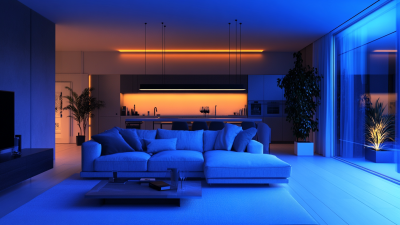
Future of Smart Lighting Systems Market Analysis and Strategies for Global Buyers
-
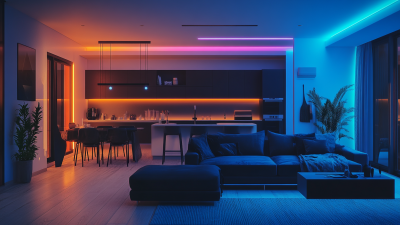
Unlock the Potential of Smart Lighting Systems: A Comprehensive Guide to Energy Efficiency and Sustainability Trends
-
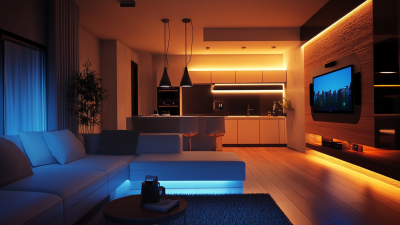
Ultimate Guide to Choosing the Best Smart Lighting Systems for Your Home
-
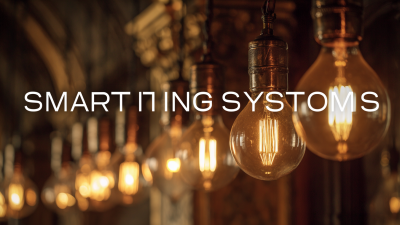
10 Digital Tips for Choosing the Best Smart Lighting Systems for Your Home
-
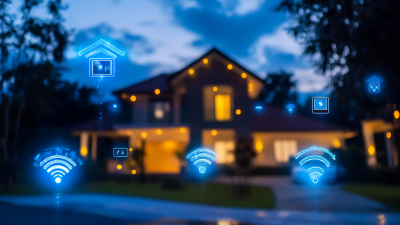
Exploring the Advantages and Applications of Smart Lighting Systems in Modern Enterprises
-

Navigating the Future of Smart Lighting Systems in 2025 Strategies for Global Buyers






